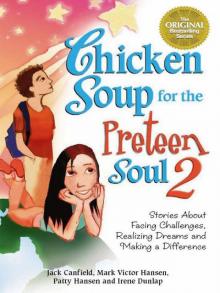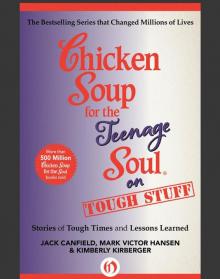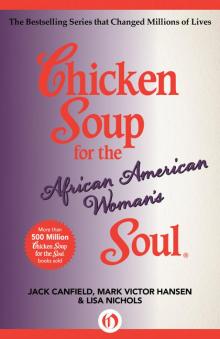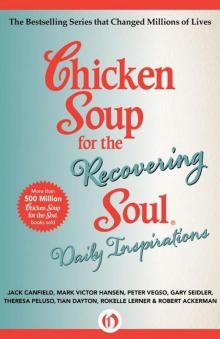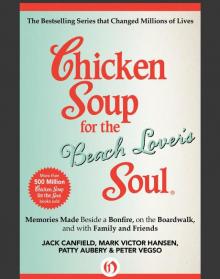Stories About Facing Challenges, Realizing Dreams and Making a Difference, page 15




Robert Frost
I was about nine the first time I got on a board. Something inside of me connected to surfing unlike any other sport. I had played a bunch of different sports, like baseball, soccer and hockey, but surfing became my true life passion. I never regretted walking away from all other sports in the pursuit of surfing.
By the time I was eleven or twelve, I began to compete in surfing. Before long, I was rated number one in the Juniors level of the Pacific Surf Series. I was featured in surfing articles and magazines, and companies began sponsoring me.
I began traveling to surfing competitions to some of the most beautiful places in the world. Things were really looking up. My lifelong dream of becoming a professional surfer was finally on the verge of becoming a reality. Then came the day when my life changed forever.
I woke up like on any other day. I watched a little bit of a surf movie to pump myself up for my surf session. I was excited; the waves were going to be so good. I called my friends. When I pulled up to the beach at Zuma, the waves looked great. I put my wetsuit on and surfed for a while; then I caught this one perfect south swell peak. I stood up backside and pulled in the barrel. As I came out of the tube, the wave hit me in my back so fast that I didn’t have time to put my hands up. I hit my head on a sandbar beneath the surface of the water. My whole body went numb and tingly, then I was floating face down—unable to move. When the next wave flipped me over, I yelled for help. At first nobody came to help me, then finally my best friend, Brad, came over to me. I told him, “You gotta keep my head out of the water or I’m gonna drown!”
With the help of another friend, Brett, Brad was able to get me out of the water and onto the beach. I knew I was paralyzed. As I lay on my back, my dreams of becoming a pro surfer, of having a wife and kids, and my hopes of being in a big surf movie flashed in front of my eyes. What was going to happen to me? What kind of a life would I have if I was paralyzed forever? This can’t happen to me! Guess what? It did.
I was taken by helicopter to UCLA Medical Center where it was determined that I had suffered a severe spinal cord injury, just like Christopher Reeve. With the flip of a wave, I had become a quadriplegic with no sensation or movement below my mid-chest. In that split second, my surfing days as I had known them were over. With only limited use of my arms and hands, I spent most of my time in intensive care units and rehab hospitals instead of in the water surfing. My worst nightmare had come true, and I was forced to deal with it.
As bad as it was, and it was very bad sometimes, I surprised myself by maintaining the will to live. I can’t really say what made me go from not wanting to live if I couldn’t surf—to embracing life without surfing—but by some miracle, it happened. Instead of being angry or afraid, I realized how fortunate I had been the first seventeen years of my life. I realized that I was still better off and more fortunate than some others. I had surfed the world—more than many could ever say.
That fall, I returned to school. I was elected Homecoming King, which was pretty cool, and ended up graduating on time. Shortly after my high school graduation, I enrolled at San Diego State University, stayed as busy as I was before the accident and graduated. I’ve got to say that I’m living my life to the fullest.
Every year, I speak to thousands of students in schools across the country. I really want kids to know that dreams can change and life can turn out different from what we sometimes expect. At the start of an assembly, I show a video of me surfing in competitions, rippin’ on the waves and everything. They expect to see this high-profile surfer coming to speak to them, and then I come out in a wheelchair. They just don’t anticipate that at all. I talk about the fact that my life has really just begun. I explain to them about the importance of family and friends. I tell them about how, since the accident, I’ve gone out on wave runners, gone waterskiing and inner tubing, played wheelchair tennis and ping pong, competed in a billiards tournament—playing pool with the best of them—and have even jumped out of an airplane skydiving!
I’ve traveled to places like Australia, France, Mexico, Spain, Italy and all over the United States. So many people have gotten behind me. Celebrities have helped me raise public awareness of the need to find a cure for spinal injuries, and I’ve also hung out with some very cool, great musicians.
But the highlight of my life since my injury came nearly four years after that fateful day. It took surfers like world champions Rob Machado, Kelly Slater and my brother Josh, and the guys from the Paskowitz Surfing Camp to figure out just how to get me back on a board again—and they did it.
I finally got back in the water that I had missed so much—on a surfboard. They rigged a board so that I could hold on to something and ride the waves. I ride lying down, more like a body boarder would, but hey, it’s still surfing to me. It’s different—but I’m in the water.
Some people kind of freak out, thinking about me out in the water surfing again, but I don’t even think about the danger. I’ve got a lot of trust in my abilities and the people around me. I make my own path, my own decisions. I’m the last one who wants to get hurt. Still, if it weren’t for the help of my buds, I might not have ever had the chance to get back out there. I don’t know of another quadriplegic in the world who surfs.
I believe that someday I’ll regain some use of my paralyzed limbs. It is no longer a question of if, but when. I’ll be ready, when the time comes, to take advantage of the breakthroughs in modern medicine. I know I’ll never achieve my dream of being the world’s greatest surfer, but dreams are abundant. I still have so many that are just as worthy and exciting—so many dreams that I have yet to achieve. I know that I’ve got a lot of living left to do. Life rolls on, waves continue to roll on and I’m rollin’ and surfing right along with it all.
Jesse Billauer
[EDITORS’ NOTE: To find out more about Jesse and his organization, Life Rolls On, log on to www.liferollson.org.]
Kindness Is More Powerful
As the sun makes ice melt, kindness causes misunderstanding, mistrust, and hostility to evaporate.
Albert Schweitzer
“Is she coming?” my shaky voice cracked. I didn’t dare look behind me. My sister, Kayleen, turned to see the front of the middle school where eager seventh- and eighth-graders were pushing their way to carpools or making their way down the sidewalk toward an evening of television and homework.
“No,” she whispered, “but if we walk faster, maybe we’ll miss her completely. I’ll bet she’s still waiting for you outside the gym door.”
I walked faster with my head bent down because tears were stinging my eyes and my nose had started to run. My heart was beating furiously and I had a sick feeling in my stomach.
Who was “she”? you might be wondering. Her name was Sabrina, and she was a bully. We were in gym class together, and I was less than athletic—more like pathetic! I didn’t run very fast, and I was afraid of being hit by a ball, so I was a ducker not a catcher.
That day during gym class, we had played soccer. I not only embarrassed myself, I also made Sabrina mad—basically because she was on my team, and we didn’t win. So, in the shower, she threatened me! “I’ll meet you after class,” she sneered, “and you will wish you and I had never met!”
I didn’t need to wait until after class, I already wished we had never met!
As soon as class was over, I snuck out the teacher’s entrance and ran to my locker where Kayleen was already waiting for me, so we could walk home together.
“What’s up with you?” she asked, noticing the look of panic in my eyes. “Sabrina!” I choked. “We lost the soccer game in gym and it was my fault. She was on my team.”
“Oh,” Kayleen simply stated, but she patted my back in understanding. “Well,” she said, “we’ll walk down Seventeenth South instead of Harrison. It’s out of the way enough that Sabrina won’t have a clue.”
Kayleen and I lived straight down the hill about a mile from Clayton Middle School. Sabrina lived somewhere in the middle. She had followed us most of the way chanting harassments since the first day of school. I couldn’t figure out what I had ever done to her. She couldn’t have had an idea of how bad I was at sports on the first day of school!
My mother said it was because I was quiet and kind and nonconfrontational that made me an easy target for bullies. I just felt like a loser! I was grateful for Kayleen, though. I always knew I could count on her. I think because she was my older sister, she felt like she needed to be my protector, and she was, always thinking of ways to avoid Sabrina or any of her sidekicks who enjoyed harassing me on a daily basis.
“Slow down!” Kayleen gasped. “You’re practically running. We’re far enough away now to be safe.”
I looked up and Kayleen noticed my tears. “What about tomorrow?” I sobbed. “She’ll just make it worse tomorrow!”
Kayleen stopped dead in her tracks, causing me to stop, as well. I turned to look at her. She stood there with her hands on her hips. “Well, then,” she said in her favorite grown-up voice, “I guess you just might have to tell someone, then!”
“It will just make it worse,” I mumbled.
The next day arrived in record time. As Kayleen and I made our way up the steep Harrison Avenue hill, I felt sick. “I still think you should tell somebody,” Kayleen chirped every few minutes.
I never replied until she had said that at least ten times, and then I burst out, “Tell somebody what? That Sabrina is mean and scary and just creeps me out? She’s never actually done anything! Am I supposed to just tell them I am a big, fat baby who can’t handle seventh grade because she is in it, too? What am I supposed to say?” Kayleen didn’t respond. We walked the rest of the way in silence.
In homeroom, Sabrina’s best friend passed me a note that stated, “At lunch, you will pay for running away!” I didn’t even look up, but I accidentally swallowed my gum and choked until Mr. McKonkie excused me to go and get a drink.
Walking down the hall, I felt a slight sense of relief and freedom. Still, the note had me scared, and I ducked into the girls’ bathroom and just cried. When I calmed down enough, I washed my face so I could go back to class without it being totally obvious. As I made my way down the hallway, I had a sick feeling that I was being followed.
Suddenly, someone kicked me in the back of the leg, hard. I almost fell over. “You little chicken!” Sabrina’s voice sneered. I didn’t turn around, I just walked faster. Why wasn’t she in class? I wondered in my panic. I turned to go into Mr. McKonkie’s class, but Sabrina blocked me. I turned again and started running down the hall. I had no idea what she was going to do, but three months of constant harassment was weighing heavily on my mind, and I was really freaked out.
Sabrina was now chasing me. At last, she caught up with me enough to kick the back of my legs, trying to knock me down. In a panic, I swung around to the staircase that led to the science and math department. Sabrina was so close to me by then that my sudden shift in direction knocked her off balance and she toppled down the stairs. I stood there watching her fall.
At first, I felt a sudden independence and victory. I turned to walk away from her when I noticed she hadn’t stood up yet. Instinct took over, and I suddenly wasn’t afraid of her anymore. I practically jumped down the stairs and touched her shoulder. “Can I help?” I asked. When she looked up, I could tell she was in pain. “I can’t walk,” she moaned. I helped her into a standing position, put her arm around my shoulder and together we hobbled to the nurse’s office.
Sabrina never harassed me after that. We never became friends, but from that moment at the foot of the stairs, I knew I had earned her respect. She still hated being on my team in gym class, but things were different. Her best friend would still start in on me sometimes, but Sabrina would shake her head and quietly say, “Leave her alone.”
And she always would.
Janalea Jeppson
[EDITORS’ NOTE: For more information about how to deal with bullies, log on to www.kidshealth.org (key word search:“bullying”).]
Bully Girl
For a while now she’s teased me
I’ve learned to ignore it
But some things she’s said
Just stay in my head
The looks and the faces
Mean and unkind
Bugging me, bothering me
Scaring my mind
My life will get better
In the end she will see
Those things that she said
Brought the strength out in me
To stand up to her
Make her leave me alone
Then I’ll finally shine
A light all my own.
Alex Estey, twelve
Foxtrot. 2003 Bill Amend. Reprinted with permission of UNIVERSAL PRESS SYNDICATE. All rights reserved.
Anything Is Possible
When your heart is in your dream, no request is too extreme.
Jiminy Cricket
When I was a little kid, I would always come in last when my friends and I ran races. I was never fast at running. I also had a hard time playing basketball because I couldn’t jump well. It’s hard to jump when your ankles don’t move. So, I was always picked last to be on a team. I used to get so frustrated and would be really upset about my “fake legs.” But I made up for it all when I got my first pair of Rollerblades.
I was born with a condition that caused me to have to be fitted with prosthetic legs and feet. I got my first ones when I was eight months old. Also, my fingers on my left hand were joined together. I had to have surgery to separate them, and as a result, I now have only eight fingers. But for those of you who think that a person with no feet and only three fingers on one of his hands should be in “special ed” classes—well, you’ve got me way wrong.
At first it was pretty hard to learn to skate—I kept falling. But I liked the way I felt; while I was on skates, I felt like I was able to move just as fast as the other kids. So, I kept practicing—and I learned how to get up. Soon, I got better and faster. Then, when my friends were running races, I would put on a pair of Rollerblades and skate the race with them. Win or lose, I was able to keep up.
Since skating had become my favorite thing to do, I signed up for the local roller hockey team and then the ice hockey team. I began playing hockey year round.
When I first joined, I thought I would just skate up to the net and take a shot. But I soon found out it wasn’t so easy. I didn’t score one single goal that whole season.
So, I trained hard in the off-season and the next year I signed up again. When I got through with the tryout, I was actually put into an older age bracket. The problem was, the kids in the older group were huge, and I quickly became intimidated. They actually stole the puck from me during the first game, and I didn’t know what to do. I remember thinking, Aren’t we on the same team? It made me feel like quitting, and I didn’t show up at the next game. But my parents and my younger brother encouraged me to get back in there and keep trying.
On the next game day, late in the game, we were losing four to five and I was playing right wing. Finally, a pass came to me and I took the shot. To me, everything went in slow motion. I saw the puck fly into the net just as the buzzer went off. My goal tied the game. When my team came skating over to me with excitement, I realized that I really could become good at this game. It would be the first of many goals.
Now, at thirteen years old, I have played in three all-star games for ice hockey and roller hockey, all on able-bodied teams, and I don’t even know how many goals I’ve scored in my entire career. I play for the American Amputee Hockey Association as well. We play all over the country and we have even played in Canada and Russia. Recently, I got sponsored by Nexed, an inline-hockey skate company. I get free shirts, hats, skates—anything that has to do with inline hockey. And just think, all this stuff started with one little two-second goal—and an awesome prosthetist named Eric.
Eric makes my prosthetics and knows exactly what I want and need. He’s always looking for ways to make them function better. Before this year, my prosthetic legs had no bendable ankles. I had to grow to a certain height—and this year Eric made them for me. Now I know what it’s like to have my feet on the ground while my legs move around. These new prosthetics with ankles that bend are good for running, jumping, hiking, and golf, which I recently took up. However, the old style where the ankles don’t bend, is great for hockey—and, as a matter of fact, creates an advantage for me over other kids, whose ankles can get strained or even broken during a game. Now, I can choose which prosthetic I want to wear, according to the sport I’m playing!
I can also decorate my legs any way I want. I bring Eric a T-shirt or patches and he laminates them right onto the legs. I used to have the Rangers and Yankee logos—once I even had the American flag. Now I have them with tiedye and Green Day and Nirvana patches. Everyone thinks they’re pretty cool.
I’ve had some pretty funny things happen, like the time that I joined an out-of-town roller hockey team. Most of the guys on the team and their parents didn’t know that I wore prosthetics. (You can’t tell with all my equipment on.) So, you can just imagine everyone’s faces when one of my legs came flying off during the game, as I was trying to shoot a goal. My leg kept going toward the net almost scoring a goal! There was dead silence in the arena. I think everyone was in shock! The two coaches came to get me off the rink. One coach carried me, the other coach carried my leg.
When I got off the rink, everyone just started clapping and whistling—they were flipping out! I don’t think anyone who was there will forget seeing that! My mom helped me get my leg back on and all we could do was laugh at what had just happened. When the game was over, people kept coming up to me and shaking my hand like I was the “most valuable player” or something.

